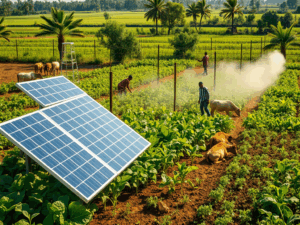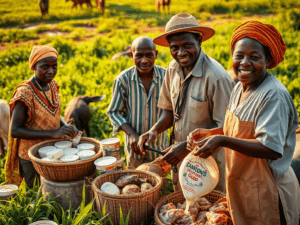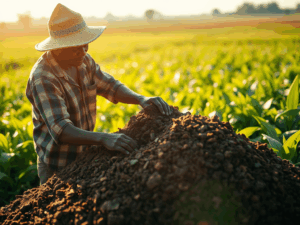
Agribusiness is transforming Africa, and women are at the heart of this revolution. Across the continent, women are breaking barriers, driving innovation, and making significant contributions to the agricultural sector. Their involvement is not just a matter of gender equity; it is an economic imperative that promises to unlock the full potential of Africa’s agribusiness.
Empowering Economic Growth
Women make up a substantial portion of the agricultural workforce in Africa, with an estimated 70-80% of food produced by smallholder farmers being cultivated by women. In Nigeria, women play crucial roles in the production, processing, and marketing of agricultural products. For example, the Women Farmers Advancement Network (WOFAN) empowers women farmers in Northern Nigeria by providing access to modern farming techniques and resources. Through WOFAN, women are trained in improved agricultural practices, water conservation, and pest management, significantly improving crop yields and incomes. One success story is that of Fatima Gambo, a farmer from Kano State who, after joining WOFAN, saw her rice yields double, enabling her to send her children to school and reinvest in her farm.
In Kenya, the Kenya Women Agribusiness Program (KWAP) has made a significant impact by providing women with the skills and resources needed to start their own agribusinesses. For instance, Jane Wanjiru, a beneficiary of KWAP, started a small dairy farm that has now grown into a successful enterprise supplying milk to major cities. This not only provides her with a stable income but also creates job opportunities within her community.
Innovators and Change-Makers
Women in agribusiness are not just participating; they are innovating and leading. In Ghana, the Women in Agriculture Development Directorate (WIAD) offers comprehensive support to women in agribusiness, focusing on training in modern agricultural practices, value addition, and market access. WIAD has been instrumental in helping women farmers adopt technologies such as improved seed varieties and drip irrigation, which have led to increased productivity. A notable example is that of Adjoa Aidoo, who transformed her small cocoa farm into a thriving business by adopting WIAD’s recommended practices and now exports her cocoa products internationally.
Similarly, in Nigeria, the Babban Gona initiative, co-founded by Kola Masha, supports smallholder farmers, including many women, by providing access to high-quality inputs, credit, and training. Babban Gona’s innovative model ensures that farmers, like Amina Musa from Kaduna State, receive tailored advice and support throughout the farming season. This holistic approach has resulted in substantial yield increases and income growth, enabling women farmers to achieve greater economic independence and invest in their families’ futures.
Overcoming Challenges
Despite their significant contributions, women in agribusiness face numerous challenges, including limited access to land, credit, and markets. In many African societies, traditional gender roles restrict women’s opportunities in the agricultural sector. However, various organizations and policies are working to address these barriers. The Nigerian government’s Women in Agriculture (WIA) program is a testament to such efforts. This initiative provides women with access to agricultural inputs, training, and credit facilities, enabling them to scale their agribusinesses. For instance, through the WIA program, women like Chidinma Okeke have received micro-loans to purchase high-yield seeds and fertilizers, leading to a significant increase in their farm output.
Similarly, in Rwanda, the government’s Gender Monitoring Office ensures that women have equal access to agricultural resources and opportunities, fostering an inclusive and productive agricultural sector. The impact is evident in stories like that of Esther Mukeshimana, who, with support from the government, transitioned from subsistence farming to commercial farming, significantly improving her family’s standard of living.
The Future of Women in Agribusiness
The future of agribusiness in Africa is bright, with women leading the charge towards a more sustainable and prosperous future. As more women gain access to education, technology, and financial resources, their impact on the agricultural sector will continue to grow. Empowering women in agribusiness is not just a step towards gender equality; it is a strategic move to boost economic growth, enhance food security, and drive innovation across the continent.
For those looking to invest in Africa’s agribusiness sector, supporting women-led ventures is a wise and impactful choice. Organizations such as the African Women in Agricultural Research and Development (AWARD) provide fellowships and training to women scientists, ensuring that women play a central role in agricultural research and policy-making. By championing the efforts of women in agriculture, we can unlock a wealth of potential that will benefit not only the individual farmers but also their communities and nations at large.
Conclusion
Women are the backbone of Africa’s agribusiness, driving growth, innovation, and sustainability. Their role is indispensable, and their contributions are transforming the agricultural landscape. As we continue to support and empower women in agribusiness, we pave the way for a more equitable, prosperous, and food-secure Africa. This is not just a narrative of empowerment; it is a call to action for all stakeholders to invest in and champion the incredible potential of women in agriculture. The time to act is now.



